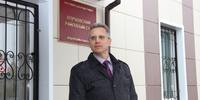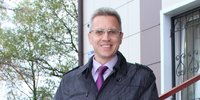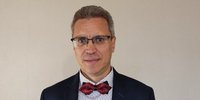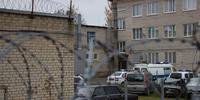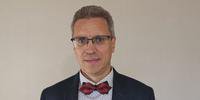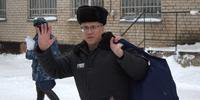The Case of Khabarov in Porkhov
Filter
- #
A criminal case was initiated against Sergey Komissarov and Aleksey Khabarov under Part 1 of Article 282.2 of the Criminal Code of the Russian Federation.
- #
In the village of Dedovichi, Pskov region, a local believer's social media page is hacked. A man discovers videos about Jehovah's Witnesses on it, as well as obscene materials.
- #
- #
Khabarov and Komissarov were summoned for questioning at the FSB of the city of Pskov. Both have an obligation to appear. The investigator insists that the believers inform her about their movements.
- #
Khabarov and Komissarov make a written request to the Commissioner for Human Rights in the Russian Federation, Tatyana Moskalkova, as well as the Commissioner for Human Rights in the Pskov Region, Dmitry Shakhov, in order to restore their good name.
"I am not a criminal, a murderer, a thief. My faith warns against all this. I try to behave honestly in everything and help others, "Khabarov writes.
- #
In his response to Khabarov's request, the Pskov Region Commissioner for Human Rights explains that "current Russian legislation ... does not establish legal responsibility for thoughts, beliefs, views, views." In addition, "the internal, spiritual freedom of a person, including freedom of religion, guaranteed by the Constitution of the Russian Federation, is not limited by legislative acts." In other words, "the spiritual realm . . . is free, both from any interference and from legal regulation." At the same time, he asserts that "the confession of the doctrine of the religious organization of Jehovah's Witnesses should not be expressed in behavior that violates the prohibitions established by law" (emphasis added).
- #
Sergey Komissarov receives a similar response from the Commissioner for Human Rights in the Pskov Region to his appeal.
- #
A criminal case was opened against Khabarov under Part 2 of Article 282.2 of the Criminal Code of the Russian Federation. An investigation begins.
- #
Aleksey Khabarov was charged under Part 2 of Article 282.2 of the Criminal Code of the Russian Federation and a preventive measure was chosen in the form of a written undertaking not to leave the place and proper behavior.
- #
Investigator Irina Pravdivtseva interrogates Aleksey Khabarov. During the interrogation, his telephone conversations for 2018 are tapped. When drawing up a protocol, the investigator independently enters some names and facts that Khabarov did not say.
The status of a believer is changed from "suspected" to "accused" under Part 2 of Article 282.2 of the Criminal Code of the Russian Federation. The change of Part 1 of Article 282.2 to Part 2 of Article 282.2 is related to the results of a linguistic religious and psychological examination, which showed that Khabarov was not the organizer of the activities of an extremist organization.
- #
Video materials are being studied during the next interrogation of Khabarov. The believer sends to investigator Pravdivtseva the testimony of the accused, in which he reports that he did not provide the information inscribed in the protocol of the previous interrogation, and refuses to testify on the basis of paragraph 3 of part 4 of article 47 of the Code of Criminal Procedure of the Russian Federation, as well as on the basis of article 51 of the Constitution of the Russian Federation. The investigator announces his intention to separate the Khabarov case into separate proceedings.
- #
The criminal case with the indictment is sent to the prosecutor of the Pskov region.
- #
The prosecutor's office returns to the investigator the materials of the criminal case with the indictment in order to eliminate the violations committed by him. Among other things, the prosecutor notes that the investigator did not carry out the necessary investigative actions and did not identify the citizens indicated as witnesses.
- #
The materials of the criminal case are presented to Alexei Khabarov and his lawyer for review and sent to the prosecutor Ivan Gribov.
- #
The prosecutor of the Pskov region, Ivan Gribov, approves the indictment after the investigation eliminated the violations.
Aleksey Khabarov is accused of taking an active part in religious meetings together with other believers, where they "talked about their faith, read the Bible, discussed issues related to this scripture, sang religious songs ...".
There is no information about the victims in the criminal case.
- #
The materials of the criminal case of Aleksey Khabarov are received by the Porkhovsky District Court of the Pskov Region. The case will be considered by judge Valentina Sirotenko.
- #
The first hearing in the criminal case of Alexei Khabarov is being held in the Porkhovsky District Court of the Pskov Region.
Judge Valentina Sirotenko refuses to admit to the defendant the Opinion of the UN Working Group on Arbitrary Detention No. 10/2020, she is also categorically against making audio recordings of the court session. At the same time, the judge agrees to accept Alexei Khabarov's written objections to the charge of committing a crime.
Prosecutor Yuriy Kravchenko asks to postpone the hearing due to the failure of witnesses to appear.
The trial is scheduled for November 18, 2020.
- #
The Porkhovsky District Court of the Pskov Region continues to consider the criminal case. 2 prosecution witnesses are being questioned. One of them gives a positive description of the accused Alexei Khabarov: he is hardworking, performs his work duties qualitatively, is very sociable and modest. The second witness does not provide the court with any significant information.
- #
Ivan Kalyt, an FSB counter-terrorism officer, is being interrogated. He talks in detail about the structure and activities of Jehovah's Witnesses, and speaks positively of the defendant: "I can only characterize him positively. He's a man of his word." Kalyta does not remember that during a search on April 3, 2019, banned literature was found in Khabarov's possession. He says that believers use mainly only materials from the Internet. He does not confirm any facts of Khabarov's financing of the activities of the religious organization.
- #
The prosecution continues to present evidence. The court is reviewing video footage from a hidden camera installed in the apartment of a woman who once showed interest in the Bible. This woman had previously appeared in court and said that she was not one of Jehovah's Witnesses. As she testified, she hesitated and could not say for sure whether a religious meeting was taking place in her apartment. The recording from 2019 shows that Alexei Khabarov and his friend are talking with the owner of the apartment, who herself invited them to visit, on spiritual and everyday topics, drinking tea and playing with children.
Judge Valentina Sirotenko appoints a forensic examination and asks experts to determine whether the friendly meeting on the video is a meeting of a religious organization.
- #
Alexei Khabarov objects to the examination and asks to appoint highly qualified specialists as experts. According to the defendant, the tasks set by the court are not within the competence of experts, and the wording of the questions causes double interpretation and contradicts each other. The believer also asks the court for the opportunity to be present during the forensic examination, giving explanations.
- #
Alexei Khabarov testifies to the court. He notes that during the trial, not a single piece of evidence of his involvement in extremist activities was found. He points out that his civil rights have been violated under at least 9 articles of the Russian Constitution. According to the believer, "the investigating authorities inappropriately freely interpret the decision of the Supreme Court of the Russian Federation of April 20, 2017" and discriminate against him because of his religion.
- #
Referee: Valentina Sirotenko. Porkhovsky District Court of the Pskov Region (Porkhov, Pushkin Street, 45).
The prosecutor requests for Aleksey Khabarov a sentence of imprisonment for 3.5 years in a general regime colony.
The believer makes his last word, emphasizing the incompatibility of his beliefs with extremism.
The last word of the defendant Alexei Khabarov in Porkhov - #
Judge Valentina Sirotenko postpones the announcement of the verdict until September 7. She explains this by the fact that the protocol of the verdict has not yet been prepared.
- #
Judge Valentina Sirotenko sentences Aleksey Khabarov to 3 years probation.
- #
The Pskov Regional Court cancels the sentence imposed on Aleksey Khabarov and returns it for reconsideration to the same court with a different composition.
- #
The case against Alexei Khabarov is again submitted to the Porkhovsky District Court of the Pskov Region for reconsideration.
- #
The Porkhovsky District Court of the Pskov Region is starting a new trial of the criminal case against Aleksey Khabarov under Part 2 of Article 282.2 of the Criminal Code of the Russian Federation (participation in the activities of an extremist organization). The case is being heard by Judge Alexei Borisovich Nikitin.
- #
As in the first consideration of the case, the prosecutor requests for Aleksey Khabarov a sentence of 3.5 years of imprisonment in a general regime colony with restriction of liberty for 6 months.
- #
The Porkhovsky District Court of the Pskov Region acquits Aleksey Khabarov.
- #
- #
- #
This is the third time that Khabarov's case has been submitted to the Porkhovsky District Court.
- #
Aleksey Khabarov was denied consideration of his cassation appeal.
- #
A witness for the prosecution, a woman whose mother spoke with Alexei on biblical topics, is being interrogated. Her testimony differs from what she said at the preliminary investigation stage. The witness explains this by the fact that at that moment she was frightened.
- #
A woman, the mother of the previous witness, is being interrogated. She thanks Jehovah's Witnesses for helping her understand the Bible. The woman confidently declares that she has never heard from Khabarov calls for a change of power or undermining the constitutional order.
- #
The materials of the case are being investigated - screenshots from Khabarov's computer, as well as recordings of telephone conversations.
- #
The court continues to examine the case materials, including transcripts of conversations and screenshots from Khabarov's computer. Two videos shot with a hidden camera are also shown. On the first, Khabarov and his co-religionists discuss biblical topics at the home of one of them, on the second, they talk with a woman who is interested in the Bible.
- #
Alexei Khabarov testifies to the court.
- #
Alexei Khabarov participates in the pleadings and delivers his last word. The prosecutor requests a sentence of 4 years of imprisonment with restriction of liberty for a term of 6 months and a subsequent restriction not to change the place of residence without notifying the inspectorate.
The last word of the defendant Aleksey Khabarov in Porkhov at the retrial of the case - #
The believer is taken into custody in the courtroom and sent to SIZO-2 in the Pskov region, located in the city of Velikiye Luki.
- #
Alexei Khabarov is doing well. He is kept alone in a 4-bed cell. For an hour a day, he is taken out for a walk separately from other prisoners. Since the Bible was confiscated from the believer upon admission to the detention center, he writes applications addressed to the head of the pre-trial detention center so that it can be returned to him or another one given to him. The letters have not yet been handed over to him.
- #
Alexey Khabarov was placed in solitary confinement after quarantine. During the month of his stay in the pre-trial detention center, he has already received many letters of support. This helps him maintain a positive attitude. He also enjoys being able to read the Bible.
- #
- #
Aleksey Khabarov is in correctional colony No. 4 in the Novgorod region. He works in a sewing workshop. The believer regularly receives letters and responds to them. His mood is cheerful.
It becomes known that the Court of Appeal, held in December, was held via video conferencing. The monitor was seen only by the judges. Even during the break, Khabarov's friends who came to the meeting were not allowed to see him.
- #
Aleksey Khabarov is being held in a barracks designed for 60 people. He maintains a positive attitude and good spirits. He has the ability to exercise and take vitamins to maintain his health.
The believer's relations with other prisoners are normal. Some, after communicating with Khabarov, stopped using foul language and smoking.
The believer regularly receives letters of support and has the opportunity to read the Bible.
- #
Aleksey is kept in a barrack for 77 people. Living conditions are satisfactory. Prisoners can use the refrigerator, TV, shower, and play chess. They also have an outdoor area and a sports field. Aleksey's relations with other prisoners are normal, and with the administration they are neutral.
The believer is still in a good mood. He has the opportunity to read the Bible from the colony's library.
Aleksey can be visited by friends. He is very happy to meet with him. The believer keeps in touch with his parents by phone, as they cannot come to him for health reasons and long distance - they live 1300 km from the colony.
Aleksey regularly receives letters and tries to answer them regularly.
- #
- #
It becomes known that Aleksey Khabarov spent 3 days in the punishment cell for being "late for formation".
The believer actively participates in the social life of the colony, organizing sports competitions. In his circumstances, he does not lose his sense of humor, he writes poetry at his leisure. He receives parcels and letters of support.
- #
Aleksey Khabarov is kept in a barrack for 80 people, where there is a refrigerator and a TV. Relations with the administration of the colony and other prisoners are good. Recently, Aleksey was allowed a long-term visit for the first time.
The believer continues to work in the sewing workshop. In his spare time, he reads the Bible and books from the local library, plays sports and, as far as circumstances allow, answers letters.
- #
From June 17 to June 26, Aleksey Khabarov was in a punishment cell for an unknown reason. After leaving the punishment cell, he suffered from a cold. Now the believer feels well. He has the opportunity to cook his own food and grow herbs. Recently, friends visited him.
- #
Aleksey Khabarov is in penal colony No. 9 in the Novgorod Region.
- #
Living conditions in the penal colony are satisfactory. There are 15-20 people in the room. There is a refrigerator and a kettle, but there is no hot water. Aleksey has a normal relationship with the administration. At the moment, there is no work in the penal colony.
Aleksey remains optimistic. He regularly takes exercise and vitamins. The believer has already received more than 2300 letters; due to the sheer number he does not manage to answer all of them.
- #

